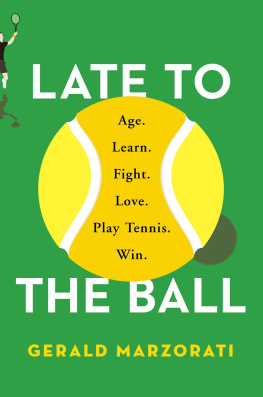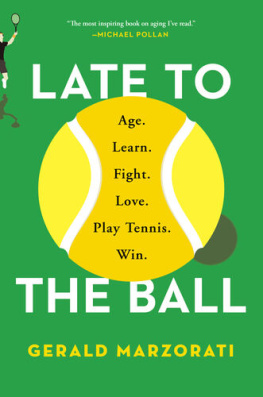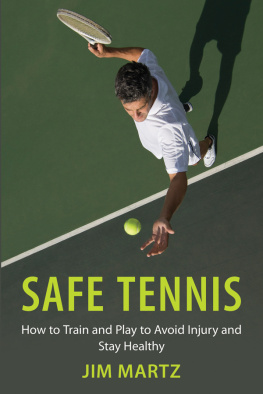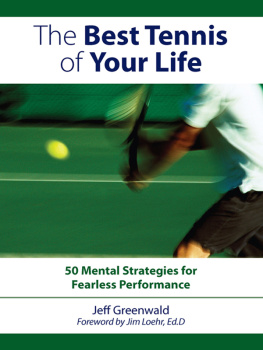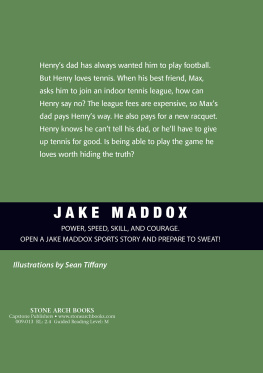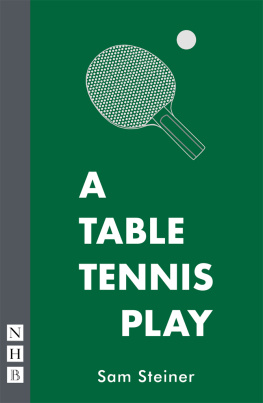Thank you for downloading this Scribner eBook.
Join our mailing list and get updates on new releases, deals, bonus content and other great books from Scribner and Simon & Schuster.
C LICK H ERE T O S IGN U P
or visit us online to sign up at
eBookNews.SimonandSchuster.com
For my sons, Guy and Luca
What do you do if youre sixty-two and you realize all those bodily parts invisible up to now (kidneys, lungs, veins, arteries, brain, intestines, prostate, heart) are about to start making themselves distressingly apparent... ?
Heres what happens: you feel excruciatingly how old you are, but in a new way.
Philip Roth, The Dying Animal
To toss the ball, to arch my back,
unwind like lightning,
with the stringed surface, from the shoulder
to skim the balls occiput,
and, lunging, the whistling return
to devastatingly cut short
the world has not a sweeter pastime...
in heaven we shall be playing ball.
Vladimir Nabokov, The University Poem
Sometimes, Tom, we have to do a thing in order to find out the reason for it. Sometimes our actions are questions, not answers.
John le Carr, A Perfect Spy
D oes the court seem small somehow to you? I asked Kirill.
He took a long look. It does.
But I couldnt figure out why, precisely, and neither could he.
We had made our way to Court 3 at the old West Side Tennis Club in Forest Hills, Queens, and were loosening up: stretching our shoulders and wrists, running in place, lunging, bouncing on the balls of our feet. Id decided to enter the 2013 United States Tennis Association Senior National Grass Court Championships, and the tournament organizers had made a number of the courts available for practice in the days before play would begin.
Maybe its the texture of the surface, the grass, I said, mostly just to say something. Or the faintness of the chalk lines?
Or that the grass ends about two inches in front of the baselines, Kirill said.
It was true: There was nothing but worn footpaths of dirt along the back edges of the court.
And, upon closer inspection, the grassryegrasswithin the service boxes and especially at the very back of the court on both sides looked as though it had been worked over by a bogey golfer trying to improve his chip shot. There were divots everywhere, the result, it turned out, of a summerlong weevil infestation.
Still, the two of us were thrilled. Crazy, Kirill said, taking phantom swings with his racquet and looking around.
Here we were, an evening at summers end, a hint of fall in the quickly cooling air, the light crepuscular, the Manhattan skyline visible and set against streaks of violet and orange. And looming in the foreground of that vista, the darkened hulk of the old, horseshoe-shaped Forest Hills Stadium, where the U.S. Opens of my youth had been played, and where the game incorporated what I like to think of as its New York refashionings: set-accelerating tiebreakers, equal prize money for female and male players, raucous nighttime tennis under the lights. The last of those Opens was played in Forest Hills in 1977, ten years before Kirill was born. It was news to him that the Open had been played at the stadium. Most people his age probably knew of it, if they knew of it at all, from its appearance as Windswept Fields in Wes Andersons The Royal Tenenbaums the stadium where tennis prodigy Richie Tenenbaum (Luke Wilson), in Bjrn-Borg-like headband and Fila polo, has, on court, what can only be called a poignantly hilarious nervous breakdown. (The grass court in the movie is a green carpet, impeccable.)
Kirill was my club pro, my year-round tennis coach, my young friend. He was less than half my age. I was nearing my sixty-first birthday, and we were on a grass court in Forest Hills on a weeknight in September because I was attempting to become a serious amateur tennis playernot that I was sure what that meant, exactly. The best sixty-something tennis player at my club in suburban Westchester? Someone who was going to spend his encore years, as they were now calledthose empty-nested, downshifted years between midlife and something dreadfulas the athlete he had never really been? Here, at Forest Hills, Id been accepted into the tournament as an unseeded qualifier, which most anyone who was between sixty and sixty-five and a member of the United States Tennis Association could do, though you wouldnt unless you were pretty good, or a masochist. You would be facing the best mens players sixty to sixty-five in the country. Id only been playing tennis six years. I was in truth a serious novice. I wasnt in their league. But I wanted to get out here and learn what league I was in.
Kirill was teaching me and coaxing mefor hours on end each weekto get there, wherever there wound up being. I had been taking lessons with him almost from the beginning, though had been truly training with him, with tireless (or, anyway, panting) determination, for two years. In the tournament, I would be playing men who had been playing tennis all their lives. Many of them had played on their college teams. Like me, they were in their early sixties, which meant they were aging, and feeling it. But for them, as not for me, aging meant seasoned, wiser, in some ways better. I was still, after hundreds and hundreds of hours of grueling drills with Kirill, and countless matches against friends, fellow tennis-club members, and opponents from other clubs, not sure how good I wasgood as a sixty-something, that isand, to be honest, not sure what it was I was after from tennis.
And I had never played a match on grass.
We, Kirill and I, started off that evening in Forest Hills with a little mini-tennis, each of us near the net on either side of it: slow-hitting aimed at seeing the ball into the sweet spot of the racquet head, relaxing the swing, tinkering with spins. Kirill urged me to focusto watch how the ball, off the deadening grass, was failing to bounce any higher than my bent knees; to notice how the matted blades of grass, or what there were of them, enhanced backspin and sidespin. When we both moved away from the net after a few minutes, he instructed me to position myself an inch or two inside the baseline.
Your game isnt going to work so well here, Gerry, he said. He was standing at the baseline on his side of the net, and he spoke loud enough for me to hear, which meant loud enough for the players tuning up for the tournament on courts to either side of us. What he was saying, and he was right, was that my usual approach, when I stepped onto the green-gray Har-Tru clay of the club where I played and he coached me, was not going to be effective on this surface. On clay, I liked to camp a foot or two behind the baselineto give the incoming ball time to descend from its high, clay-court bounce into my favored hips-to-knees strike zone; to give myself more time to react to the incoming ball. I ran well side-to-side and in toward the net and backspeed and quickness were the only real advantages I had over most players my ageso court coverage was never a problem for me.
But staying back doesnt win points on grass. Here, I was going to have to come forward to return balls that werent going to bounce up much, and keep moving in to get to the net. I was going to have to find ways to end points in a hurry: I wouldnt get enough predictable bounces to rally. I was going to have to serve and volley; chip and charge on my service returns, especially on serves to my backhand; and, with my forehand, aim audaciously for the corners early, flatly, and with pace. In sum: Against players who were likely to be better than those I typically played againstbetter than me I was going to have to play a style of tennis I never played. In a national tournament.
Next page
